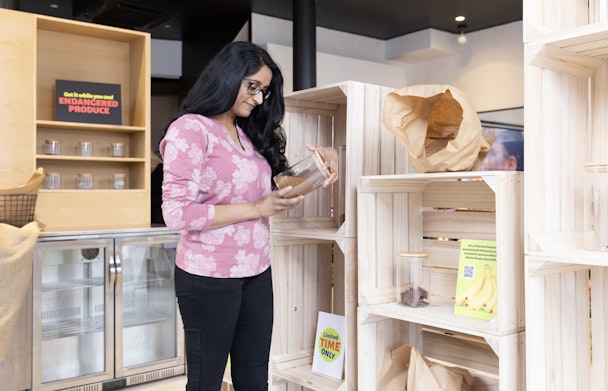How Fairtrade is encouraging sustainable choices during cost of living crisis
As consumers prioritize price over the planet, trusted brands must work with retailers to keep sustainable shopping accessible says the foundation’s marketing leader.

Fairtrade's 'Endangered Aisle' looked at how UK shopping might look different due to climate change / Fairtrade
Fairtrade has been at the helm of sustainability for the best part of three decades. As the foundation’s head of brand and marketing, Jackie Marshall, tells The Drum: “It has been a long journey.” The cost of living crisis presents it with a major issue, however, with consumers opting out of more sustainable choices in order to save money.
According to its Endangered Aisle report, which surveyed shoppers to see how climate change is likely to shape UK supermarkets in the future, 43% of UK consumers said that paying for their energy bills is a bigger concern to them than climate change, with 50% saying that price is a barrier to shopping sustainably and that they would simply look for the cheapest option. “It’s affecting partners, it’s affecting brands and it’s changing the ways people purchase,” explains Marshall.
“What we have found, however, is that Fairtrade has some of the highest awareness and highest trust levels among sustainable brands and that’s particularly important in a crisis like this when people need to get back to a brand they can trust.
“When people are shopping, they have about three seconds to make a choice about a product in-store. We need to make sure our brand is on the front of the pack and highly visible, which is where strong brand awareness comes in.”
To combat the deprioritization of sustainability as a result of people’s limited budgets, Marshall says it’s absolutely vital that it works with retailers and partners to amplify its message and to show up clearly in the shopping space.
Advertisement
Fairtrade Week, which took place between February 27 and March 12 this year, was crucial to pushing this awareness, says Marshall, with it holding more than 600 events in stores across the country. These aimed to not only highlight the availability of Fairtrade products, but also their accessibility. “We wanted to highlight that, no matter your budget, there is a Fairtrade product for you.”
“30% of people didn’t even know that our products are stocked in Lidl and Aldi, but they are some of our biggest cocoa buyers. So, amid the cost of living crisis, we’ve really been pushing the message that you can get Fairtrade chocolate at Aldi or a Fairtrade coffee for £1.15 at Greggs and, accordingly, we’ve seen more retailers want to move over to 100% Fairtrade commitments.”
But the cost of living crisis is not the only challenge facing sustainable brands, adds Marshall. With the space becoming increasingly crowded, more and more brands are looking to differentiate themselves with sustainable credentials such as B Corp or through green marketing jargon – “the noise is significant,” she says.
Advertisement
Fairtrade has reacted by updating its brand identity, with its new ’The Future is Fair’ strategy for the first time running across all of its global markets. “We have 22 offices around the world and work closely with the producer networks in those locations. I think it’s an excellent move to remind people that we’re a united front across the regions.“
With an ongoing investigation by the CMA into the FMCG category, Marshall says it’s the perfect time to remind consumers that Fairtrade is “intrinsically different“ because of its farm involvement and its grassroots support. “We ensure the farmer’s voice is always represented at the board level and we always have a farmer presence at any kind of major event we do.”
And, she says, it’s not just at the supply chain level that Fairtrade seeks to be impactful. “We also push for change on a governmental level, backing campaigns to lobby MPs, and we’ve been present at Cop26 and 27 calling for climate justice. We work across all fronts to push for systemic change, which is probably why we were awarded Super Brand status for 2022/23 from a panel of over 1,500 brands.
“Fairtrade is more than just a brand, it’s a whole movement.”
Suggested newsletters for you
On its long-standing commitment to ethical and sustainable systems within the supply chain, she says: “Our bedrock is the Fairtrade minimum price, which ensures a minimum price that is always met whatever the market conditions. The Fairtrade premium is the additional money that goes to fund specific projects that are chosen by the communities themselves.”
In the past, that money was more likely to be funneled into infrastructure for farmers, but increasingly it’s going towards climate adaptation in the regions where Fairtrade farmers operate – Africa, Asia and South America. “It’s our farmers who are on the frontline of the climate crisis.”
Helping consumers feel connected to the projects they are sponsoring is also crucial to inspiring a sense of optimism around the climate crisis. “We see a lot of challenges around climate change and our message is that there are future options where people get involved and feel empowered to take small actions.”
And there is reason for optimism. According to Fairtrade’s report, 44% of UK consumers believe that making small lifestyle changes can help individuals have an impact on climate change, while 38% are already making changes to their shopping habits in order to limit their impact on the planet.

